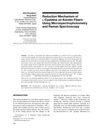 4 citations,
August 2018 in “Journal of Cosmetic Dermatology”
4 citations,
August 2018 in “Journal of Cosmetic Dermatology” Actual harvested hair follicles were fewer and differed in type from estimated, with older patients and those with multiple transplants needing more careful planning.
 June 2006 in “The American Journal of Cosmetic Surgery”
June 2006 in “The American Journal of Cosmetic Surgery” Advancements in cosmetic and reconstructive surgery improve techniques and patient satisfaction.
 1 citations,
January 2008 in “Elsevier eBooks”
1 citations,
January 2008 in “Elsevier eBooks” The document concludes that various disorders can cause hair loss in dogs, each requiring different treatments, and some may heal on their own.
 February 2022 in “Endocrine connections”
February 2022 in “Endocrine connections” People with reproductive, thyroid disorders, and type 2 diabetes can experience voice changes, but more research is needed to understand this better.
 115 citations,
May 2016 in “Clinical Medicine & Research”
115 citations,
May 2016 in “Clinical Medicine & Research” TSH is usually the only test needed to check thyroid function in primary care.
 114 citations,
October 2009 in “Gastroenterology”
114 citations,
October 2009 in “Gastroenterology” Zinc is crucial for nutrition, especially in patients with specific health conditions, and requires careful supplementation and monitoring.
 9 citations,
April 2018 in “Journal of trace elements in medicine and biology”
9 citations,
April 2018 in “Journal of trace elements in medicine and biology” Hair analysis can show nutritional status and environmental exposure, with phosphorus being very stable in hair and differences found based on gender and conditions like depression and autism.
 3 citations,
February 2023 in “ACS omega”
3 citations,
February 2023 in “ACS omega” Grape seed oil improved hair quality the most, followed by rosehip and safflower seed oils, and reduced damage from shampoo.
 29 citations,
August 2005 in “Biopolymers”
29 citations,
August 2005 in “Biopolymers” L-cysteine slows down the breaking of bonds in hair due to electrostatic interactions.
 October 2022 in “Legume Research”
October 2022 in “Legume Research” The research found a way to grow plant tissue and analyze compounds in Bituminaria bituminosa, which is promising for hair restoration treatments.
10 citations,
August 2020 in “Acta histochemica” All-trans-retinoic acid stops mink hair growth by affecting cell growth and causing cell death.
 1 citations,
January 2015 in “Hair therapy & transplantation”
1 citations,
January 2015 in “Hair therapy & transplantation” Some supplements and hormones can increase hair loss by raising DHT levels.
 15 citations,
June 2015 in “Human Cell”
15 citations,
June 2015 in “Human Cell” Spheroid culture in agarose dishes improves survival and nerve cell growth in thawed human fat-derived stem cells.
5 citations,
January 2016 in “Open Journal of Regenerative Medicine” Myoblast transplantation shows promise for treating various muscle and heart conditions.
September 2017 in “Springer eBooks” Certain supplements, like whey protein isolate and growth hormones, can worsen hair loss.
 10 citations,
June 2019 in “Journal of Tissue Engineering and Regenerative Medicine”
10 citations,
June 2019 in “Journal of Tissue Engineering and Regenerative Medicine” Scientists successfully grew new hair follicles in regenerated mouse skin using mouse and human cells.
 36 citations,
December 2015 in “Drugs”
36 citations,
December 2015 in “Drugs” New treatments for a chronic skin condition show promise, but individualized plans are crucial due to varying responses.
 54 citations,
January 2005 in “Journal of The American Academy of Dermatology”
54 citations,
January 2005 in “Journal of The American Academy of Dermatology” Most patients with chronic hair shedding did not progress to permanent hair loss, and one showed improvement with treatment.
 October 2020 in “Journal of Pakistan Association of Dermatology”
October 2020 in “Journal of Pakistan Association of Dermatology” Platelet-rich plasma therapy is more effective than minoxidil lotion for increasing hair count in men with hair loss, with mild side effects and high satisfaction.
 53 citations,
June 2017 in “Skin appendage disorders”
53 citations,
June 2017 in “Skin appendage disorders” PRP treatment helps hair growth in most cases, but more research needed.
 1 citations,
August 2024 in “Polymers”
1 citations,
August 2024 in “Polymers” The P25H5-O microneedles effectively deliver substances through hair follicles and are safe for skin cells.
 11 citations,
April 2018 in “Nutrition Research”
11 citations,
April 2018 in “Nutrition Research” Chromium supplements don't help with weight loss or improve hormone and metabolism issues in people with polycystic ovary syndrome.
 10 citations,
June 2021 in “Primates”
10 citations,
June 2021 in “Primates” Wild geladas in crop areas show less grooming and aggression.
 6 citations,
September 2020 in “Advanced Biology”
6 citations,
September 2020 in “Advanced Biology” Blue-light activation of TrkA improves hair-follicle stem cells' ability to become neurons and glial cells.
 1 citations,
January 2023 in “Journal of pharmaceutical and biological sciences”
1 citations,
January 2023 in “Journal of pharmaceutical and biological sciences” Ethosomes are a promising way to deliver drugs through the skin.
 147 citations,
April 1994 in “Drug Safety”
147 citations,
April 1994 in “Drug Safety” Some drugs can cause hair loss or increase hair growth, but these effects are usually reversible when the drug is stopped.
 5 citations,
May 2023 in “Frontiers in immunology”
5 citations,
May 2023 in “Frontiers in immunology” Environmental factors like diet and vitamin levels, especially Vitamin D, can affect autoimmune diseases differently, with lifestyle changes potentially improving outcomes.
 16 citations,
April 2011 in “Journal of The American Academy of Dermatology”
16 citations,
April 2011 in “Journal of The American Academy of Dermatology” Dermatologists play a key role in identifying and documenting signs of abuse and injury for forensic investigations.
 3 citations,
January 2018
3 citations,
January 2018 Amla oil may help treat hair loss.
2 citations,
January 2016 in “Advanced biomedical research” The hair wax with propolis and Eruca sativa seed oil promotes hair growth effectively.


























